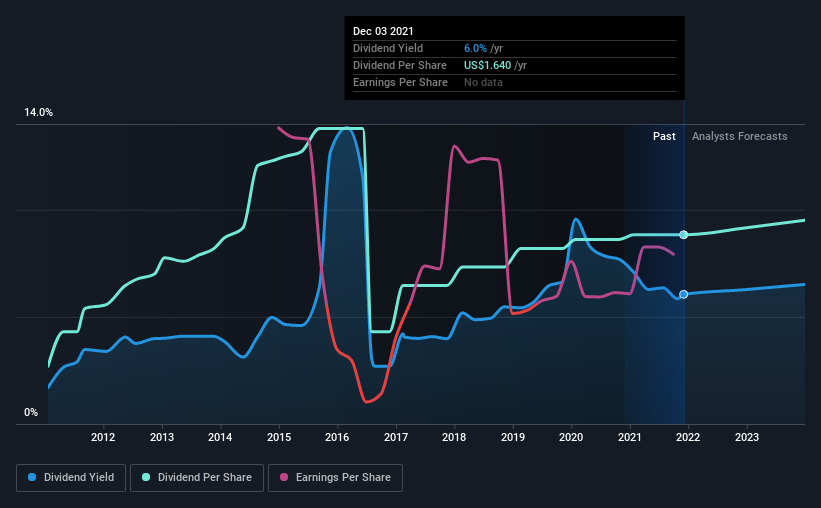Williams Companies (NYSE:WMB) Has Announced A Dividend Of US$0.41
The Williams Companies, Inc. (NYSE:WMB) will pay a dividend of US$0.41 on the 27th of December. This makes the dividend yield 6.0%, which will augment investor returns quite nicely.
See our latest analysis for Williams Companies
Williams Companies Doesn't Earn Enough To Cover Its Payments
A big dividend yield for a few years doesn't mean much if it can't be sustained. Based on the last payment, the dividend made up 75% of cash flows, but a higher proportion of net income. While the cash payout ratio isn't necessarily a cause for concern, the company is probably focusing more on returning cash to shareholders than growing the business.
Earnings per share is forecast to rise by 46.3% over the next year. However, if the dividend continues growing along recent trends, it could start putting pressure on the balance sheet with the payout ratio reaching 126% over the next year.
Williams Companies Has A Solid Track Record
The company has a sustained record of paying dividends with very little fluctuation. The dividend has gone from US$0.50 in 2011 to the most recent annual payment of US$1.64. This works out to be a compound annual growth rate (CAGR) of approximately 13% a year over that time. It is good to see that there has been strong dividend growth, and that there haven't been any cuts for a long time.
The Dividend's Growth Prospects Are Limited
Investors could be attracted to the stock based on the quality of its payment history. However, Williams Companies has only grown its earnings per share at 4.8% per annum over the past five years. The earnings growth is anaemic, and the company is paying out 196% of its profit. This gives limited room for the company to raise the dividend in the future.
The Dividend Could Prove To Be Unreliable
Overall, it's nice to see a consistent dividend payment, but we think that longer term, the current level of payment might be unsustainable. We can't deny that the payments have been very stable, but we are a little bit worried about the very high payout ratio. We don't think Williams Companies is a great stock to add to your portfolio if income is your focus.
Investors generally tend to favour companies with a consistent, stable dividend policy as opposed to those operating an irregular one. At the same time, there are other factors our readers should be conscious of before pouring capital into a stock. For instance, we've picked out 2 warning signs for Williams Companies that investors should take into consideration. If you are a dividend investor, you might also want to look at our curated list of high performing dividend stock.
Have feedback on this article? Concerned about the content? Get in touch with us directly. Alternatively, email editorial-team (at) simplywallst.com.
This article by Simply Wall St is general in nature. We provide commentary based on historical data and analyst forecasts only using an unbiased methodology and our articles are not intended to be financial advice. It does not constitute a recommendation to buy or sell any stock, and does not take account of your objectives, or your financial situation. We aim to bring you long-term focused analysis driven by fundamental data. Note that our analysis may not factor in the latest price-sensitive company announcements or qualitative material. Simply Wall St has no position in any stocks mentioned.

 Yahoo Finance
Yahoo Finance 
